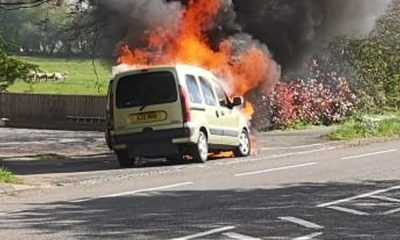By Mark Waghorn via SWNS
Almost one-in-10 Brits reckon witches and wizards really do exist, according to new research.
Belief in the supernatural is widespread around the world - including western Europe, suggest the findings.
In the UK, one in 11 adults (nine percent) reckon some people have magical powers.
It is feared they put curses or spells on individuals - and can even bring down governments.
A global dataset across 95 countries linked the faith to weak institutions and conformist rather than libertarian cultures.
In the past followers would have been strapped to a ducking chair - before being submerged for 10 minutes.
"Witchcraft beliefs are still widespread around the world," said lead author Professor Boris Gershman, of American University.
"Moreover, their prevalence is systematically related to a number of cultural, institutional, psychological, and socioeconomic characteristics."
The findings are based on a survey of more than 140,000 people. Over 40 percent claimed to believe in witchcraft.
They were of the opinion "certain people can cast curses or spells that cause bad things to happen to someone."
It equates to around one billion people. Globally, the figure is much higher. China, India and South East Asia were not included - areas with a long history of stories of sorcery.
But the phenomenon varies substantially between countries - and within regions. The UK is at the lower end of the scale - compared to 90 percent of believers in Tunisia.
The study, published in the journal PLOS One, could have alarming implications for combating climate change and other challenges - such as Covid and the war in Ukraine.
"The conformist culture and resistance to change promoted by witchcraft beliefs poses a threat to the process of innovation - backbone of long-run economic growth," Gershman said.
It reduces entrepreneurial risk and ambitious business plans by eroding social capital and increasing anxiety.
Gershman also found witchcraft beliefs are linked to higher levels of in-group bias - the tendency for people to favor others who are similar to them.
"These findings, as well as future research using the new dataset, could be applied to help optimize policies and development projects by accounting for local witchcraft beliefs," he said.
Witchcraft was deemed heresy and denounced by Pope Innocent VIII in 1484. It was made a capital offense in Britain in 1563.
Beliefs in witchcraft have been linked to recent reports of rape, assault, false imprisonment and threats to kill in the UK.
In one incident, police were called after a parent said their child was "pushed down stairs by a ghost or spirit" and a priest had been asked to do an exorcism.
A rape suspect accused the alleged victim of involvement in witchcraft, while a report of false imprisonment involved a man who believed in Voodoo.

 Parenting1 day ago
Parenting1 day ago
 Broadcast3 days ago
Broadcast3 days ago
 Broadcast1 week ago
Broadcast1 week ago
 Funny1 week ago
Funny1 week ago
 Broadcast2 days ago
Broadcast2 days ago
 Shopping1 week ago
Shopping1 week ago
 Money3 days ago
Money3 days ago
 Parenting1 week ago
Parenting1 week ago






















